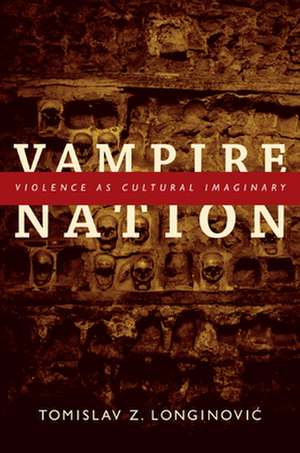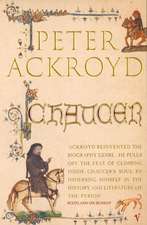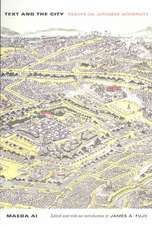Vampire Nation – Violence as Cultural Imaginary: The Cultures and Practice of Violence
Autor Tomislav Z. Longinovicen Limba Engleză Paperback – 11 aug 2011
Preț: 237.47 lei
Nou
Puncte Express: 356
Preț estimativ în valută:
45.45€ • 46.84$ • 38.37£
45.45€ • 46.84$ • 38.37£
Carte tipărită la comandă
Livrare economică 03-17 martie
Preluare comenzi: 021 569.72.76
Specificații
ISBN-13: 9780822350392
ISBN-10: 0822350394
Pagini: 224
Ilustrații: 9 illustrations
Dimensiuni: 161 x 236 x 30 mm
Greutate: 0.32 kg
Editura: MD – Duke University Press
Seria The Cultures and Practice of Violence
ISBN-10: 0822350394
Pagini: 224
Ilustrații: 9 illustrations
Dimensiuni: 161 x 236 x 30 mm
Greutate: 0.32 kg
Editura: MD – Duke University Press
Seria The Cultures and Practice of Violence
Cuprins
AcknowledgmentsIntroduction. Violence in Translation: The Vampire Metaphor in the Age of Nationalism; 1. The Great Vampire Swindle: Global Cultural Imaginary and the Violence ofthe serbs; 2. Bloody Tales: Figurations of Masculinity in the Post-Oriental Condition; 3. Sounds of Blood: Yugoslavism and Its Discontents; 4. Locations of Horror: Bosnia in the Literary and Political Imaginary; 5. Quieting the Vampire: Voicing Violence in the Post-Human AgeNotes; Bibliography; Index
Recenzii
"This fascinating and important post-Yugoslav study of violence, especially in relation to Serbia and the Serbs, poses crucial questions about how Serbian violence has been understood from within Serbian culture, from within the Yugoslav and post-Yugoslav framework, and from the external perspective of the European gaze. Tomislav Z. Longinovic, one of the worlds leading scholars on South Slavic literature and culture, offers a cultural study that provocatively illuminates the complexities of Serbian identity, the metaphor of vampirism in south-eastern Europe, the meaning of violence within an imagined community, and the mental mapping of the former Yugoslavia." Larry Wolff, author of Inventing Eastern Europe: The Map of Civilization on the Mind of the Enlightenment
"The book offers plentiful and juicy illustrations. For instance: the Ottoman practice of blood tribute in which Christian Slav boys were abducted from their homes, converted to Islam, and inserted into the Ottoman social order, is interpreted within the frame of the book as a violence that subsequently nurtures collective insecurities that can be (and have been) exploited.... Given the elastic qualities of vampirism, it is not surprising that the book comes together as a collage of artistic and literary artefacts that are rather impressive in their range.... Vampire Nation presents a daunting task, with its frequent references to Jacques Lacan and Jacques Derrida (among others) and its emulation of their deconstructive strategies. But for those willing to take the challenge, there is plenty to bite into in this book." - Dragana Obradovic, Times Higher Education, 2nd February 2012
"The book offers plentiful and juicy illustrations. For instance: the Ottoman practice of blood tribute in which Christian Slav boys were abducted from their homes, converted to Islam, and inserted into the Ottoman social order, is interpreted within the frame of the book as a violence that subsequently nurtures collective insecurities that can be (and have been) exploited.... Given the elastic qualities of vampirism, it is not surprising that the book comes together as a collage of artistic and literary artefacts that are rather impressive in their range.... Vampire Nation presents a daunting task, with its frequent references to Jacques Lacan and Jacques Derrida (among others) and its emulation of their deconstructive strategies. But for those willing to take the challenge, there is plenty to bite into in this book." - Dragana Obradovic, Times Higher Education, 2nd February 2012
Notă biografică
Descriere
A nuanced analysis of the cultural and political rhetoric framing the serbs as metaphorical vampires in the last decades of the twentieth century

























